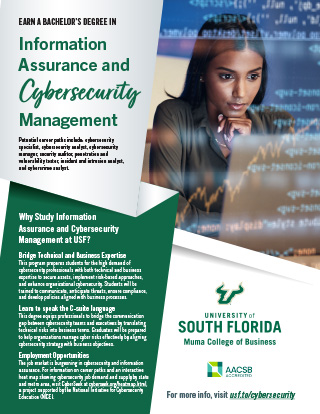Information Assurance and Cybersecurity Management
Major
The Information Assurance and Cybersecurity Management major presents strong hands-on skills combined with theoretical approaches to develop a solid foundation of knowledge, skills and competencies necessary for cybersecurity professionals. The program focuses on the technical as well as soft non-technical skills necessary for securing and protecting organizations against cyber risks and threats. Topics covered include – but are not limited to - network security, database management and security, risk management, cybersecurity intelligence, security governance and policies, cloud security, and security protocols. These important topics relate to managing the availability, integrity, authentication, confidentiality, and non-repudiation of the information infrastructure as well as its restoration, integrating protection, detection, and reaction capabilities.
There is a great demand for cybersecurity practitioners who not only have the technical ability but also business expertise to:
- apply security expertise across a wide variety of business enterprises
- operate under pressure with a strong ethical backbone
- understand business processes and the impact of compromised assets
- communicate and implement risk-based approach to security
- apply cybersecurity skills to generate actionable intelligence to improve cybersecurity hygiene within an organization
- anticipate and respond to real-world cybersecurity threats, and
- develop security policies and track compliance
- apply critical thinking skills to develop holistic cybersecurity policies and procedures
- apply cybersecurity standards in practice
The curriculum for the Information Assurance and Cybersecurity Management degree offers skills, aligned with NIST framework, that combines business core courses across the range of business functions and cybersecurity core courses that offer skills in overall management of the cybersecurity function in business enterprises including business management of cybersecurity, risk management, and incident business response, using analytics to detect, isolate, and prevent cybersecurity attacks. Visit the curriculum guide to learn more about the degree progression.
Why Information Assurance and Cybersecurity Management?
Many organizations continue to struggle with a communication disconnect between the C-suite and cybersecurity personnel when it comes to formulating a cyber security strategy. While the cybersecurity experts are speaking in terms of exploits, vulnerabilities and incidents, non-technical C-suite may not always follow what is being said. Similarly, cybersecurity personnel may not have the capabilities to understand and express the cyber risks in terms of budget allocation and cost recovery. The degree originated with the notion that organizations need cyber security professionals who have technical and non-technical skills to bridge this gap in communication. To formulate a unified cybersecurity strategy within the organization, graduates need to make sure that they speak the language of budget and risk so that they can effectively communicate cybersecurity concerns to the C-suite. The degree assumes that cybersecurity management is a business function. Therefore, graduates with a degree in information assurance and cybersecurity will gain vast technical and non-technical knowledge and skills in both business and cybersecurity to be the frontline of support for governments and organizations to address and manage their cyber security risks. They will gain familiarity with converting threats into estimated loss and thus speak the C-suite language.
Employment Opportunities
Graduates can expect to work as a cybersecurity specialist, cybersecurity analyst, cybersecurity manager, security auditor, penetration and vulnerability tester, incident and intrusion analyst, and cybercrime analyst. The job market is burgeoning in this field. For more information on career paths in cybersecurity and information assurance, visit CyberSeek, a project supported by National Initiative for Cybersecurity Education (NICE). The site will also provide an interactive heat map with a granular snapshot of demand and supply data for cybersecurity jobs at the state and metro area levels.
Contact
For any questions about the program or opportunities offered to students by Cyber Florida

Giti Javidi
Professor - Director, Information Assurance and Cybersecurity Management program
javidi@usf.edu
Phone: 941-359-4267
